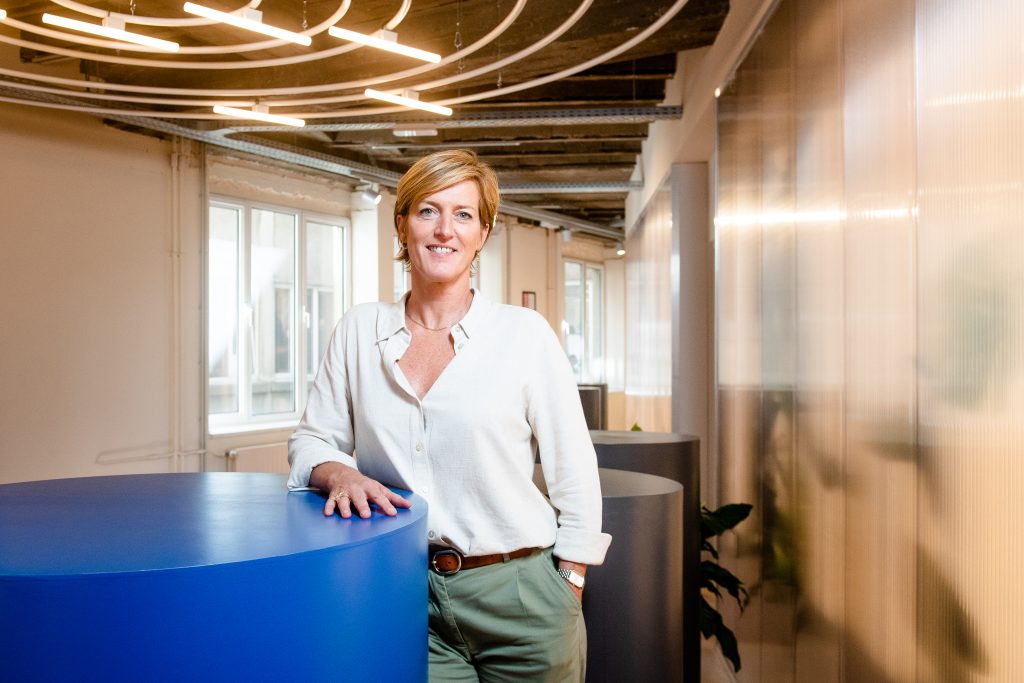Women remain underrepresented in Belgium’s digital sector – and they are reportedly using artificial intelligence less than men. But initiatives such as BeCode are working to change that.
In Belgium, women make up only around 19% of digital professionals. In half of all tech companies, the share of female ICT (Information and Communication Technology) specialists is even lower. To improve these numbers – and help the sector reach its goal of 25% female representation by 2030 – specialised schools have emerged. One of the most prominent is BeCode, Belgium’s largest coding school, with campuses in Brussels, Ghent, Liège, and Charleroi. It offers free training in digital professions to jobseekers and career changers.
“In our AI and data classes, we’ve achieved gender parity,” says Béatrice de Mahieu, CEO of BeCode. “But after the training, many women hesitate: is this sector really for me? Will I feel comfortable in a predominantly male environment? These recurring doubts partly explain why so few women go on to pursue careers in AI and ICT.”

Confidence, shaped early
This lack of self-confidence often begins in childhood and adolescence. According to the 2021 Gender Scan survey, at the start of secondary school, 43% of boys and just 27% of girls express an interest in science and technology. Among girls, interest grows steadily to 33% by ages 15–16, but by the end of secondary school, it drops off significantly for both sexes. Dismissive comments such as “It’s too hard for you” or “You’re not good enough at maths” leave a lasting impact. The survey highlighted that teachers’ and parents’ attitudes are major factors discouraging girls from pursuing studies in digital fields.
Mentorship and female role models
Julie Henry, PhD in Computer Science and project lead for STEAM (science, technology, engineering, arts, and maths) at UNamur, conducted a field study to identify best practices for attracting more women to digital training. She strongly advocates training educators at all levels to dismantle gender stereotypes, which fuel feelings of illegitimacy and deter girls from entering the field. “For instance, some teachers tend to give boys more speaking time, gradually leading girls to participate less and eventually exclude themselves,” she explains.
In response, some coding schools have introduced women-only classes, creating a more relaxed environment where female students can ask questions freely, without fear of judgment.
“Building girls’ confidence must start from a very young age,” says de Mahieu. “The infamous impostor syndrome is like a sneaky little beast. We carry it from childhood, and it grows with us. We must either get rid of it or learn to give it less space. Mentorship can be a powerful tool. At BeCode, we launched Women Tech Care, a programme that pairs mentors with female learners, offering guidance, support, and constructive feedback.”
Based on her research, Julie Henry also calls for increased visibility of experienced women in digital careers – both in schools and media – to present them as accessible, inspiring role models.
“Modelling yourself on Michelle Obama can make the goal feel so distant, it seems unattainable.”
Several initiatives align with this vision. Globally, the Inspiring Fifty programme honours 50 influential women in tech each year. In Belgium, events such as the Women in Digital Summit in Namur and the Women & AI Day in Wavre give a platform to prominent women in AI and tech, spotlighting their journeys, challenges, and achievements. BeCode also organises the *Women’s Acceleration Week*, bringing together former and current students for a week of networking, inspiration, and support.
“It’s important to look up to people whose experiences resonate with our own,” says de Mahieu. “Admiring Michelle Obama is wonderful – but if the goal feels too far out of reach, it may demotivate rather than inspire. Often, it’s more helpful to look up to a woman who is just a step or two ahead – at university, in the workplace – and move forward from there, step by step.”

A sector still struggling with inclusion
“Even after training, cultural pressures can weigh heavily on women,” de Mahieu adds. “Some are discouraged by their close circles, who insist these careers ‘aren’t for women’. These barriers come from both men and women. One striking example is a woman trained in cybersecurity who turned down a high-paying job because her husband couldn’t accept that she would earn more than him.”
BeCode supports its learners for up to a year after their training (seven months of courses followed by a three-month internship). Women generally perform exceptionally well, often receiving full-time job offers – particularly in AI and cybersecurity – even before finishing their internship.
But the digital sector is far from ideal. Some statistics are deeply troubling. A study by the Fawcett Society found that 43% of women in tech consider leaving their jobs at least once a week due to a hostile work environment. The 2022 Gender Scan reported that 46% of women in digital careers had experienced sexist behaviour since the start of their careers. According to France’s High Council for Gender Equality, 50% of women leave the tech industry before the age of 35 – compared to just 20% in other sectors.
“We must not be naïve: attracting more girls to STEM isn’t enough,” Julie Henry warned at this year’s International Day of Women and Girls in Science (11 February, Paris). “If schools and workplaces don’t change, women will keep leaving. Hostility, sexism, and lack of opportunity hinder both their development and success. Real progress requires transforming these environments into truly inclusive, welcoming spaces.”
Women and ChatGPT: a missed opportunity?
According to de Mahieu, women tend to excel in data-driven roles due to their precision, attention to detail, and analytical skills – all crucial in AI development. “Yet, despite their aptitude, they tend to use AI tools far less.”
A 2024 study by the University of Chicago, based on 100,000 employees across industries, found that women use AI tools such as ChatGPT three times less often than men – regardless of age or profession.
“The reasons are both sociological and almost philosophical,” says de Mahieu. “In general, women are less likely to ask for help – and using ChatGPT is, in essence, asking for help. Even though AI is just a tool, many women worry it will make others perceive them as less competent.”
This hesitance, she explains, reflects a deep-seated psychological trap linked to the ‘good girl’ syndrome – a cousin of impostor syndrome. “To some, using AI feels like cheating, or breaking the rules.”
“By using ChatGPT less than their male counterparts, women risk creating a new glass ceiling.”
“If this trend holds,” noted Trends-Tendances editor-in-chief Amid Faljaoui in a 2024 commentary on RTBF, “it’s bad news for women. Soon, fluency in AI will be a major asset for jobseekers. By avoiding tools like ChatGPT, women risk limiting their own social and economic progress – effectively creating a new glass ceiling.”
This is all the more worrying given that many of the professions most affected by the AI revolution – such as secretarial work, admin, and copywriting – are still predominantly female.
Read more articles:
A Beautiful Green: The Business Case For Sustainable Team-Building

